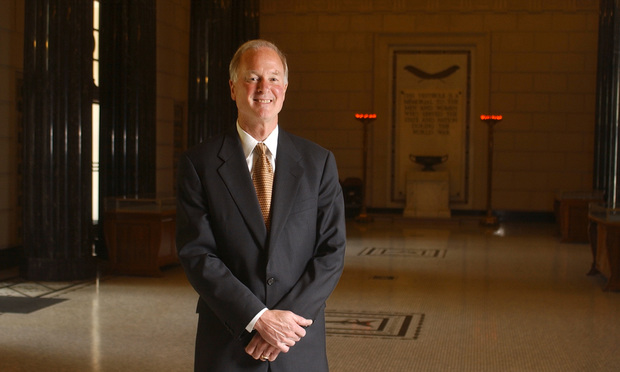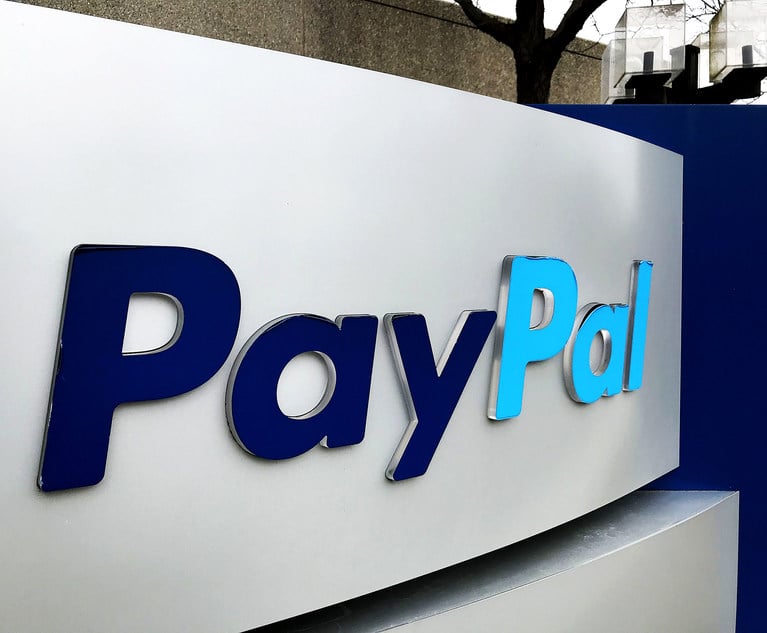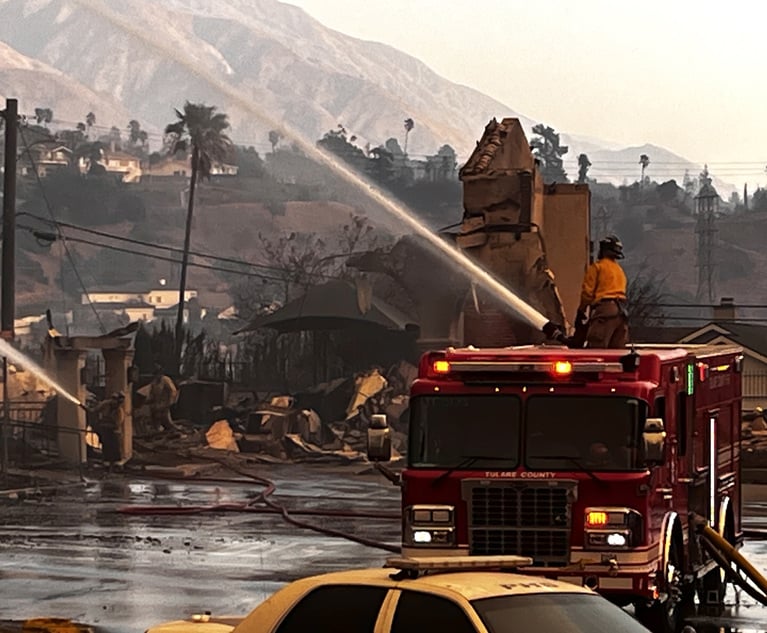CA Supreme Court Hires Former Appellate Justice to Review Bar Exam Blunder
Former Third District appellate justice Arthur Scotland is expected to release his findings this fall.
August 28, 2019 at 06:26 PM
3 minute read
 Third District Court of Appeals Justice Arthur Scotland. Photo: Jason Doiy/ALM
Third District Court of Appeals Justice Arthur Scotland. Photo: Jason Doiy/ALM
The California Supreme Court has chosen a former colleague of Chief Justice Tani Cantil-Sakauye to investigate how the state bar erroneously disclosed topics on the July bar exam before the test's administration.
Arthur Scotland, a retired presiding justice on the Third District Court of Appeal in Sacramento, will lead the investigation along with his law firm, Nielsen Merksamer Parrinello Gross & Leoni, the court announced after its regular conference Wednesday.
Scotland and his colleagues will be paid up to $60,000 for their work, according to a copy of the legal services agreement provided by the Supreme Court. Those costs will be covered by the state bar, a Judicial Council spokesman said. The former justice will start work immediately and is expected to submit his findings by November at the latest.
Scotland's investigation will be separate from one launched by a lawyer hired by the state bar earlier this month. The bar is paying former lawyer and mediator Jean Gaskill, once a partner with now-defunct Brobeck, Phleger & Harrison in San Francisco, $200 an hour plus expenses to detail how a bar staffer accidentally sent the exam's essay topics to 16 law school deans the week before the test.
Scotland served on the Third District court from 1989 to 2010. Like Cantil-Sakauye he served in the administration of Gov. George Deukmejian—he as cabinet secretary, she as a deputy legal affairs secretary and later a deputy legislative secretary. The two also served five years together on the state appellate court.
California bar leaders say the exam topics were "inadvertently" released when a bar staffer drafted a memo asking law school deans if they would be interested in attending a grading session for the July 2019 bar exam. The second page of the memo listed the six topics the exam would cover and asked deans to rank their preferences for monitoring by topic.
Such invitations traditionally go out after the exam. But the bar staffer sent the memo early this year, leading one law school dean to alert bar leaders about the disclosure the Saturday before the exam. That Saturday night, the bar sent an email to all registered test-takers that made the topics public in an attempt to ensure that no one had an unfair advantage, bar leaders said,
"The court understands and shares the concerns that this disclosure has generated," members of the California Supreme Court said in a prepared statement issued a day before the exam.
"Exercising its oversight responsibilities over matters relating to bar admissions, the court will ensure that there is a thorough and independent investigation into the circumstances surrounding the disclosure, and that appropriate steps are taken to protect the integrity of the bar examination and identify and address any consequences."
This content has been archived. It is available through our partners, LexisNexis® and Bloomberg Law.
To view this content, please continue to their sites.
Not a Lexis Subscriber?
Subscribe Now
Not a Bloomberg Law Subscriber?
Subscribe Now
NOT FOR REPRINT
© 2025 ALM Global, LLC, All Rights Reserved. Request academic re-use from www.copyright.com. All other uses, submit a request to [email protected]. For more information visit Asset & Logo Licensing.
You Might Like
View All
'It's Not Going to Be Pretty': PayPal, Capital One Face Novel Class Actions Over 'Poaching' Commissions Owed Influencers

'Tragedy of Unspeakable Proportions:' Could Edison, DWP, Face Lawsuits Over LA Wildfires?
7 minute read

Meta Hires Litigation Strategy Chief, Tapping King & Spalding Partner Who Was Senior DOJ Official in First Trump Term
Trending Stories
- 1'It's Not Going to Be Pretty': PayPal, Capital One Face Novel Class Actions Over 'Poaching' Commissions Owed Influencers
- 211th Circuit Rejects Trump's Emergency Request as DOJ Prepares to Release Special Counsel's Final Report
- 3Supreme Court Takes Up Challenge to ACA Task Force
- 4'Tragedy of Unspeakable Proportions:' Could Edison, DWP, Face Lawsuits Over LA Wildfires?
- 5Meta Pulls Plug on DEI Programs
Who Got The Work
Michael G. Bongiorno, Andrew Scott Dulberg and Elizabeth E. Driscoll from Wilmer Cutler Pickering Hale and Dorr have stepped in to represent Symbotic Inc., an A.I.-enabled technology platform that focuses on increasing supply chain efficiency, and other defendants in a pending shareholder derivative lawsuit. The case, filed Oct. 2 in Massachusetts District Court by the Brown Law Firm on behalf of Stephen Austen, accuses certain officers and directors of misleading investors in regard to Symbotic's potential for margin growth by failing to disclose that the company was not equipped to timely deploy its systems or manage expenses through project delays. The case, assigned to U.S. District Judge Nathaniel M. Gorton, is 1:24-cv-12522, Austen v. Cohen et al.
Who Got The Work
Edmund Polubinski and Marie Killmond of Davis Polk & Wardwell have entered appearances for data platform software development company MongoDB and other defendants in a pending shareholder derivative lawsuit. The action, filed Oct. 7 in New York Southern District Court by the Brown Law Firm, accuses the company's directors and/or officers of falsely expressing confidence in the company’s restructuring of its sales incentive plan and downplaying the severity of decreases in its upfront commitments. The case is 1:24-cv-07594, Roy v. Ittycheria et al.
Who Got The Work
Amy O. Bruchs and Kurt F. Ellison of Michael Best & Friedrich have entered appearances for Epic Systems Corp. in a pending employment discrimination lawsuit. The suit was filed Sept. 7 in Wisconsin Western District Court by Levine Eisberner LLC and Siri & Glimstad on behalf of a project manager who claims that he was wrongfully terminated after applying for a religious exemption to the defendant's COVID-19 vaccine mandate. The case, assigned to U.S. Magistrate Judge Anita Marie Boor, is 3:24-cv-00630, Secker, Nathan v. Epic Systems Corporation.
Who Got The Work
David X. Sullivan, Thomas J. Finn and Gregory A. Hall from McCarter & English have entered appearances for Sunrun Installation Services in a pending civil rights lawsuit. The complaint was filed Sept. 4 in Connecticut District Court by attorney Robert M. Berke on behalf of former employee George Edward Steins, who was arrested and charged with employing an unregistered home improvement salesperson. The complaint alleges that had Sunrun informed the Connecticut Department of Consumer Protection that the plaintiff's employment had ended in 2017 and that he no longer held Sunrun's home improvement contractor license, he would not have been hit with charges, which were dismissed in May 2024. The case, assigned to U.S. District Judge Jeffrey A. Meyer, is 3:24-cv-01423, Steins v. Sunrun, Inc. et al.
Who Got The Work
Greenberg Traurig shareholder Joshua L. Raskin has entered an appearance for boohoo.com UK Ltd. in a pending patent infringement lawsuit. The suit, filed Sept. 3 in Texas Eastern District Court by Rozier Hardt McDonough on behalf of Alto Dynamics, asserts five patents related to an online shopping platform. The case, assigned to U.S. District Judge Rodney Gilstrap, is 2:24-cv-00719, Alto Dynamics, LLC v. boohoo.com UK Limited.
Featured Firms
Law Offices of Gary Martin Hays & Associates, P.C.
(470) 294-1674
Law Offices of Mark E. Salomone
(857) 444-6468
Smith & Hassler
(713) 739-1250






